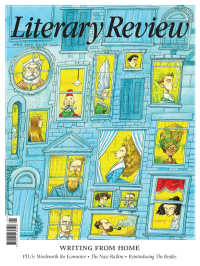Vicky Pryce
When Mortgages Were Just for Men
The Double X Economy: The Epic Potential of Women’s Empowerment
By Linda Scott
Faber & Faber 338pp £18.99
Double Lives: A History of Working Motherhood in Modern Britain
By Helen McCarthy
Bloomsbury 530pp £30
I worry that amid the economic devastation that is being inflicted worldwide by the coronavirus pandemic, the case for gender equality will move, for a while at least, to the backburner. If this happens, I sincerely hope it is only temporary, because the case needs to be made again and again. Better decisions and wider prosperity will be the outcome if discrimination against women is ended and their true contribution to society is recognised and properly remunerated. Right now, I fear that the huge drop we will see in GDP in coming months will affect women more – except those working in the NHS and at supermarket tills.
One graph hit me hard in Linda Scott’s readable new book, The Double X Economy. It shows the results of a survey carried out by the International Women’s Coffee Alliance in Kenya. This demonstrates clearly that it is women who do the bulk of the work up to the moment when the coffee has been produced and taken to market, at which point men take over, selling it and collecting the money from sales. And when it comes to who is deemed to ‘own’ the coffee, the answer seems to be that 95 per cent of it is owned by men and just 5 per cent by women.
The World Bank produces a list of countries that still impose restrictions on women’s participation in the labour force. The number of those that don’t can almost be counted on your hands. Scott, a professor of entrepreneurship at the University of Oxford, uses the research she has carried out in

Sign Up to our newsletter
Receive free articles, highlights from the archive, news, details of prizes, and much more.@Lit_Review
Follow Literary Review on Twitter
Twitter Feed
It wasn’t until 1825 that Pepys’s diary became available for the first time. How it was eventually decrypted and published is a story of subterfuge and duplicity.
Kate Loveman tells the tale.
Kate Loveman - Publishing Pepys
Kate Loveman: Publishing Pepys
literaryreview.co.uk
Arthur Christopher Benson was a pillar of the Edwardian establishment. He was supremely well connected. As his newly published diaries reveal, he was also riotously indiscreet.
Piers Brendon compares Benson’s journals to others from the 20th century.
Piers Brendon - Land of Dopes & Tories
Piers Brendon: Land of Dopes & Tories - The Benson Diaries: Selections from the Diary of Arthur Christopher Benson by Eamon Duffy & Ronald Hyam (edd)
literaryreview.co.uk
Of the siblings Gwen and Augustus John, it is Augustus who has commanded most attention from collectors and connoisseurs.
Was he really the finer artist, asks Tanya Harrod, or is it time Gwen emerged from her brother’s shadow?
Tanya Harrod - Cut from the Same Canvas
Tanya Harrod: Cut from the Same Canvas - Artists, Siblings, Visionaries: The Lives and Loves of Gwen and Augustus John by Judith Mackrell
literaryreview.co.uk